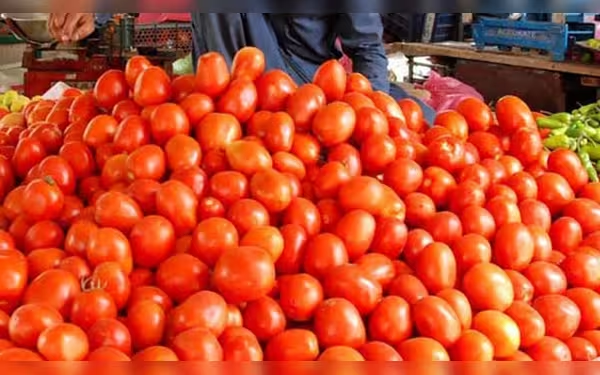Sunday, December 22, 2024 04:05 AM
Tomato Prices Surge to Rs700 per Kg in Sialkot
- Tomato prices soar to Rs700 per kg in Sialkot.
- Government price list set at Rs180 per kg ignored.
- Chicken prices decrease while vegetable costs rise.
 Image Credits: dailypakistanen
Image Credits: dailypakistanenTomato prices in Sialkot have surged to Rs700 per kg, raising concerns over food inflation and government regulation.
In recent days, the prices of essential vegetables, particularly tomatoes, have skyrocketed across various cities in Pakistan, raising concerns among consumers and authorities alike. The situation has become particularly alarming in Sialkot, where tomatoes are being sold for an astonishing Rs700 per kilogram. This surge in prices has left many wondering about the reasons behind such a drastic increase.
Reports indicate that traders are largely ignoring the government-mandated price list, which has set the price of tomatoes at Rs180 per kilogram. In other cities, the prices are also significantly higher than the official rates. For instance, in Rawalpindi, tomatoes are available for Rs400 per kg, while in Lahore, they are priced at Rs300 per kg. This discrepancy highlights a troubling trend where market forces seem to dictate prices rather than government regulations.
One shopkeeper explained that the high prices of tomatoes can be attributed to imports from foreign countries, which have become necessary due to local shortages. These shortages have been exacerbated by road closures during recent protests by the Pakistan Tehreek-e-Insaf (PTI) party, further complicating the supply chain. As a result, consumers are left to bear the brunt of these challenges, facing inflated prices for basic food items.
In contrast to the rising prices of vegetables, the cost of chicken meat has seen a slight decrease. Over the past two days, the price of chicken has dropped by Rs15 per kilogram, with an additional decrease of Rs7 today, bringing the official rate down to Rs475 per kilogram. Live broiler chickens have also become cheaper, with the wholesale rate now at Rs314 per kg and the retail rate at Rs328 per kg.
This fluctuation in prices raises important questions about the stability of food prices in Pakistan. Consumers are left feeling frustrated and confused as they navigate the market, trying to make sense of the ever-changing costs of essential goods. It is crucial for the government to take decisive action to regulate prices and ensure that citizens have access to affordable food. As the situation continues to evolve, it remains to be seen how authorities will respond to these challenges and what measures will be implemented to protect consumers from further price hikes.













